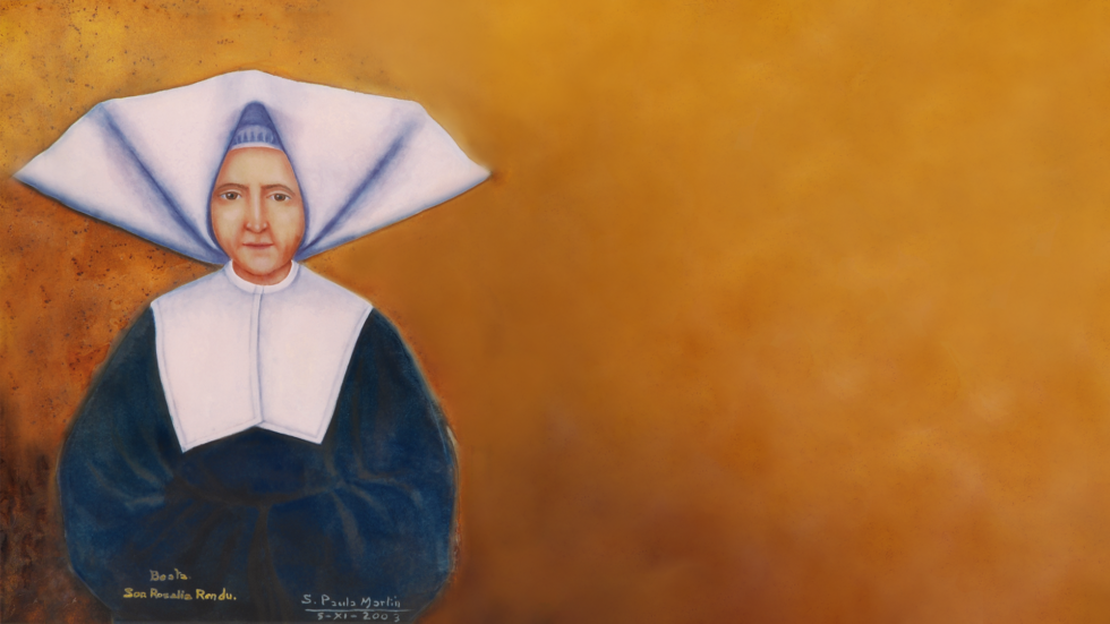
Jeanne Marie Rendu
- History
- March 17, 2023
Table of Contents
Jeanne Marie Rendu (later called Sister Rosalie Rendu) was the eldest of four girls in her family.
Her parents were simple-living but well respected people who lived in the mountains. When Jeanne was only three years old, the French Revolution broke out in France. At this time, many faithful priests were forced to flee because people wanted to hurt them, and the Rendu family home became a refuge for many of these priests.
Feast Day - February 7th
- Date of birth: September 9, 1786
- Place of birth: Confort, France
- Died: February 7, 1856
- Beatified: November 9, 2003
- Feast Day: February 7
Following the death of her father and baby sister, Jeanne helped her mother to look after the family. Jeanne’s mother sent her to a boarding school so she could get a good education During her two years there, Jeanne would walk around the town, and one day she discovered a hospital where the Daughters of Charity cared for the sick. Her mother gave her permission to spend some time at the hospital, and Jeanne soon felt called by God to become a Daughter of Charity.
Motherhouse of the Daughters of Charity
When she was nearly 17 years old, Jeanne entered the Motherhouse of the Daughters of Charity and received the name Rosalie. She took vows to serve God and the poor, and spent over 50 years living out those vows. She opened a free clinic, a pharmacy, a school, an orphanage, a childcare centre, a home for the elderly and a youth club for young workers. She became known as the “good mother of all”, and helped Frederic Ozanam and his friends to do good works, which is how the St Vincent de Paul Society started.
As well as assisting the poor in the streets and in their homes, Sister Rosalie showed great courage and leadership during the bloody uprisings that took place in France in 1830 and 1848. During the battles, Sister Rosalie would climb up on the barricades – risking her life – to help wounded soldiers, regardless of which side they were fighting on.
The last few years of Sister Rosalie’s life were painful as her health worsened and her sight diminished. She was no longer able to visit her “beloved poor” on a regular basis yet her reputation continued to grow. The emperor, Napoléon III awarded her the Cross of the Legion of Honor, a military honor that only four women had received until recent times.
She experienced in her life as a “simple Daughter of Charity” the truth of the words of Vincent de Paul in 1660, “… certainly it is the great secret of the spiritual life to abandon to God all that we love by abandoning ourselves to all that he will. Pray for me.
Although her health was always fragile, Sister Rosalie never rested; she preferred to keep serving the poor, and managed to overcome fatigue and illness. Eventually, however, her huge workload – combined with her age and increased frailty – broke her resistance, and she became progressively blind during the last two years of her life. She died on 7 February 1856.
”And it would be this simple Daughter of Charity who would be honored at her funeral, 9 February 1856. It was attended by an estimated 50,000 persons of every sector of society and every political and religious persuasion. From that day onward, flowers always decorate her grave.
Although her health was always fragile, Sister Rosalie never rested; she preferred to keep serving the poor, and managed to overcome fatigue and illness. Eventually, however, her huge workload – combined with her age and increased frailty – broke her resistance, and she became progressively blind during the last two years of her life. She died on 7 February 1856.

